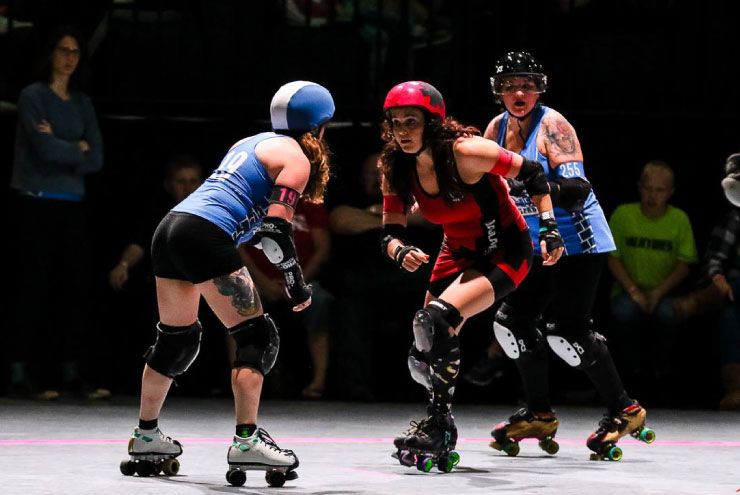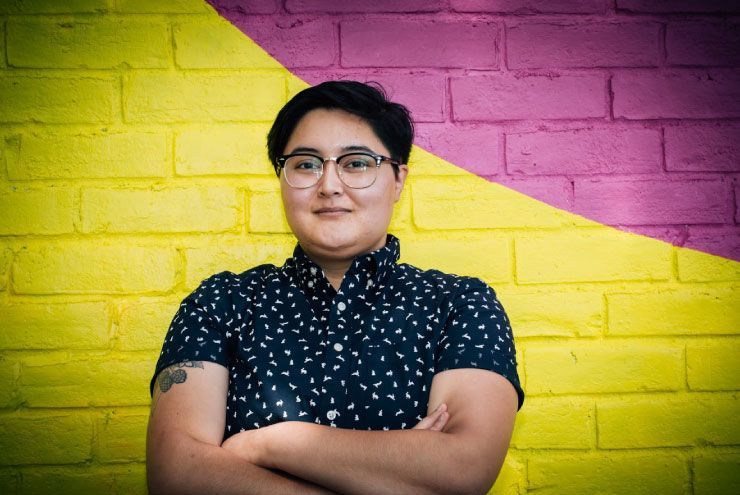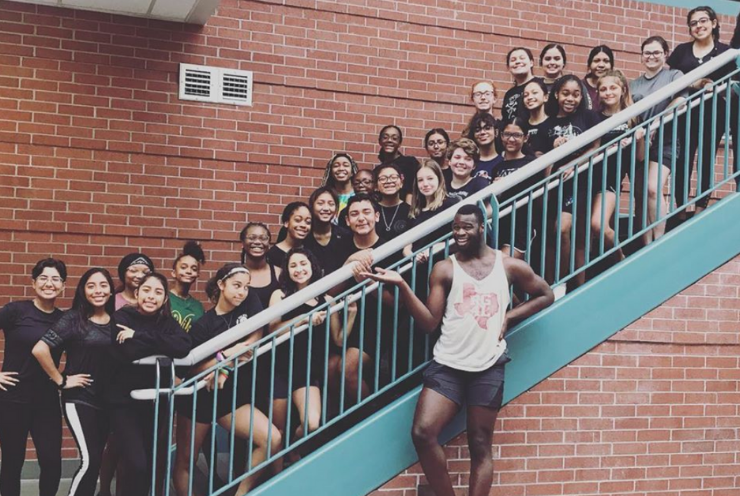Editor’s Note: This is the fourth installment of Spectrum South’s eight-part original Talk Derby to Me series. Roll by each month to meet a new queer Houston Roller Derby skater, coach, or super fan!
By Josh Watkins
For Amanda Carmona, aka Paula Cream-Her #4, finding roller derby was like finding the missing piece to the puzzle of life. Initially drawn in by the sport’s strong female leadership, Cream-Her stayed for its inclusive atmosphere, celebration of uniqueness, and team spirit. Spectrum South had the pleasure of chatting with Cream-Her about her journey of discovering her identity and roller derby, her love for Buffy the Vampire Slayer, and her rookie season with the Houston Roller Derby’s Psych Ward Sirens.
How did you first get involved with roller derby?
I feel cliché by saying this, but my eyes were opened to roller derby when the 2009 movie Whip It came out. It seemed like such a cool, tough sport to be involved in. Plus, it was led by strong women. In September 2012, I was a bridesmaid in my friend’s wedding, and the girl who was doing our hair was telling us how she was trying to get in shape because she joined a roller derby team. She said there was a new team starting up and they needed girls. I immediately wanted to know how to be a part of this. I was ecstatic because this was going to be my chance to finally play! That team became the Missfits and I skated with them for four years—both on flat and banked track—which then led me to Southside Roller Derby where I played for a couple of seasons. I played golf in high school and college, so the thought of being able get into a sport with physical contact really interested me. That’s actually where my derby name comes from—golf. There is a Ladies Professional Golf Association (LPGA) player named Paula Creamer, so you just add an “H,” and there you go! Don’t worry, no one gets it. [Laughs]. Literally two people have approached me that recognize it. Some people think I’m trying to hint at something sexual with the name—which being a lesbian doesn’t help. Then your teammates/friends really don’t help the situation when they’re screaming “I cream for Paula!” while you play.
How do you identify and what has that journey looked like for you?
I was born and raised in Houston. I grew up in a religious home much like most people in southeast Texas. I knew from a very young age that I was gay, but it was never a topic I felt that I could discuss with anyone. It’s always amazed me that, even at a young age, you know how you feel, but don’t quite understand the gravity of it because it’s not this tormenting feeling. As I grew older, it just became something I knew was wrong. Being gay was something I kept to myself, but I never compromised who I was to please someone else—as in, I didn’t talk about liking boys, try to date boys, or insult the gay community. Most girls in middle school were getting into makeup, clothing trends, and boy crushes, and I’m over here in a T-shirt and jeans with unbrushed hair, excited for the new Star Wars movie. I remember attending many Houston Comets games as a kid and—probably for the first time—I was exposed to a large group of people from the gay community. That was a good thing because, when you feel self-conscious about who you are, you’re realizing these women do exist and they’re just living their lives. But I still didn’t want to address the topic and, as a kid, you become confused on why life has to be so complicated.
I kept myself busy with sports and other extracurricular activities throughout my teens so that I’d have the excuse that I was too busy to be interested in dating. I never thought going to church would “cure” me, either. I only hoped that it would somehow give me the peace within myself that I had longed to find, but unfortunately, it never did. I just continued to feel guilty for who I was, and I began to hate myself. I tried to find a reason that, despite being gay, I could still be a good person in my actions, but it always weighed on me that, no matter what I did, it would never be enough. I would never be good enough. I questioned my self-worth every day and ultimately became depressed. I am fortunate that I was never bullied, nor had people talk down to me. I just internalized every negative thought or emotion and I had no support group to help me cope with [those feelings]. Don’t get me wrong—I came from a family that always supported me in whatever endeavour I wanted to take on. I just didn’t feel like I had the safe space to discuss being gay or the confidence within myself to be strong enough to not care what others thought. When I was in high school, the television series Buffy the Vampire Slayer was still airing. The show featured a lesbian couple and I just remember clinging onto those characters because they inspired me to have hope. That show saved me many times throughout my teens and twenties.
Towards the end of college, things got a little easier when I was able to find a good group of friends and share my secret. Of course, at that point, I needed to tell someone because I wasn’t doing myself any favors by holding it in. When you come out to your friends, you always fear the worst on how they’ll receive the news because, in your own mind, you don’t deserve their acceptance. Luckily, I never had to feel rejection from friends and life carried on. I was taking steps towards a normal life. Although my friends were accepting of me, I still had a hard time with who I was. I still didn’t like myself and I was unhappy.
To be honest, I’m not a completely out and proud lesbian. Yes, I know I’m gay and that is who I am, but I still hold onto the shame that I experienced growing up. I struggle with it often. I’m not one to throw a [Pride] party with a rainbow cake just because I’m gay. Being a lesbian is part of my identity, but I don’t necessarily need it to define me. I want the same things every other human wants—love, happiness, and to not get fat because Mexican food is so good. I respect those that want to celebrate who they are because I probably won’t ever be that person. My friends—and probably most teammates—know about me [being gay], but I don’t discuss my sexuality at work or with many family members. If people figure it out, then that’s great, but I don’t make it known. I’ve played sports and worked jobs that mostly consisted of females, so I never wanted them to think I was watching them change or mistake a simple kind gesture for something intimate. I never want my character to be questioned—not that I’ve ever experienced a situation like that, but I created this fear in my mind that I didn’t want to come true.
Roller derby is known for being a female-empowering and queer-inclusive sport. Has that been your experience?
If derby is seen as a “queer” sport, then that’s not what got my attention. I see roller derby as an edgy, non-mainstream sport, which is why it is so inclusive for everyone. It may sound silly to seek out a sense of normalcy in an environment that celebrates its uniqueness among members, but that’s what it has brought me. It’s a place I feel like I can finally fit in and be like everyone else. I never felt like I fit in the “straight” world because I couldn’t truly be myself. I attended my first Pride in college with the high hopes of finally being able to find my place—only to be disappointed because I still didn’t feel whole there, either. That’s the void that derby has filled in my life. It’s given me the security and environment to just be me, regardless of my interests or looks. I never felt like I was forcing anything. No one cares which way you go. It’s all about how you handle yourself on and off the track.
Does your queer identity impact your participation in roller derby?
I play the sport for the athleticism. I don’t feel that I hold some great responsibility because I happen to be a lesbian in the sport. As a female growing up playing sports, you get accustomed to hearing the lesbian stereotype for certain sports. I’m just proud that I can say I was lucky enough to have the time and ability to be a part of something that, when you tell someone you play roller derby, their immediate response is “Holy shit, you ladies are tough.” The sport is a good thing for all women.
What about derby keeps you coming back?
I keep playing roller derby because it gives me a reason to stay in shape and also keeps my mind distracted. It’s like therapy. I’ve always believed it’s a good thing to stay busy. I’ve also made lifelong friendships through derby, which makes the sport even better for me. There are so many people that I know I would never have crossed paths with without derby, so I am very thankful to have this sport in my life. Even though you’re competing in the sport, it’s nice to laugh and have fun with it. Otherwise, what’s the point? This year has been a little different, since I’m new to Houston Roller Derby and have had to step out of my comfort zone, but I’ve been enjoying the challenge so far.
What are your interests outside of roller derby?
Time outside of derby? What’s that?! When I get the chance, my free time is spent planning and training for runDisney trips, playing my guitar, working out, finding good food, Saturday nights at Barbarella, and immersing myself in 90s grunge music.
Do you have any advice for those considering getting into roller derby?
Get out and try it! Perhaps it will be something that will completely change your life. Even if skating may not be your thing, there are many roles within a derby league that you can take part in.
Houston Roller Derby’s next bout is Saturday, April 21 at Revention Music Center. Doors open at 6 p.m. Bouts start at 7 p.m. Tickets and more information available at houstonrollerderby.com.







